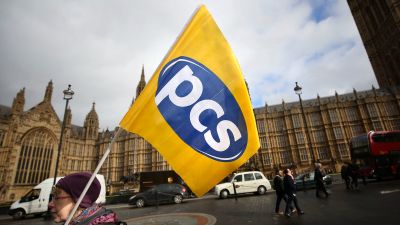Civil servants vote to strike nationwide over pay, pensions and jobs

Around 100,000 civil servants have voted for a national strike over pay, pensions and jobs, the the Public and Commercial Services (PCS) union has announced.
The union had balloted more than 150,000 civil servants in more than 200 government departments and said that the average turnout across all balloted areas was 51.6%.
Publishing the results of the ballot, it said 126 employer areas had passed the threshold for strikes, covering workers including driving test examiners, border force officials and Jobcentre staff.
The PCS national executive committee (NEC) said it has sent a letter to the Cabinet Office, demanding "meaningful negotiations" on their claim for a 10% pay rise.
"Unless substantial proposals are received from the government the NEC will agree a programme of industrial action at its meeting on Friday,18 November," the union, which represents civil servants who work in Whitehall, or in frontline services such as job centres, said.
General secretary Mark Serwotka warned that the government must now "realise it can no longer treat its workers with contempt". “Our members have spoken and if the government fails to listen to them, we’ll have no option than to launch a prolonged programme of industrial action reaching into every corner of public life," he said. “Civil servants have willingly and diligently played a vital role in keeping the country running during the pandemic but enough is enough. “The stress of working in the civil service, under the pressure of the cost-of-living crisis, job cuts and office closures means they’ve reached the end of their tethers. “We are calling on the government to respond positively to our members’ demands. They have to give our members a 10% pay rise, job security, pensions justice and protected redundancy terms.”
Civil servants have joined nurses, rail workers, university staff and potentially teachers in a wave of planned industrial action over pay and working conditions.
It comes as household finances are squeezed by inflation soaring to 10.1%, with many public sector workers already having suffered a decade of pay restraint.
The prospect of the strikes over pay pose a significant challenge to Prime Minister Rishi Sunak and Chancellor Jeremy Hunt, who are trying to tackle a huge hole in public finances.
They are considering imposing up to £60 billion in tax rises and spending cuts in the autumn budget on November 17.
Want a quick and expert briefing on the biggest news stories? Listen to our latest podcasts to find out What You Need To Know